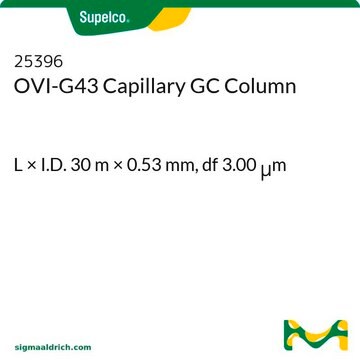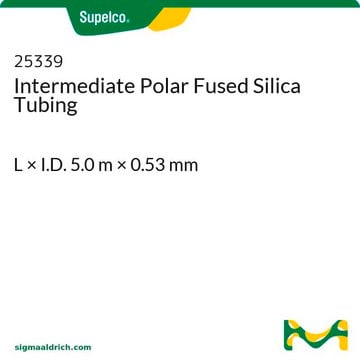25320-U
VOCOL® Capillary GC Column
L × I.D. 30 m × 0.53 mm, df 3.00 μm
Synonym(s):
F.S.CAP.VOCOL® 30M .53MM 3.0UM (NO MIX)
Sign Into View Organizational & Contract Pricing
All Photos(1)
About This Item
UNSPSC Code:
77101502
eCl@ss:
32119290
NACRES:
SB.54
Recommended Products
material
fused silica
Quality Level
Agency
EPA TO-17,502.2,624,8015,8260,OLM04.2 VOA,524.2
NIOSH 1003
parameter
≤25-230 °C temperature (isothermal or programmed)
Beta value
44
df
3.00 μm
technique(s)
gas chromatography (GC): suitable
L × I.D.
30 m × 0.53 mm
application(s)
environmental
food and beverages
forensics and toxicology
industrial hygiene
column type
capillary intermediate polar
Looking for similar products? Visit Product Comparison Guide
General description
Capillary GC column is also known as open tubular column. The carrier gas flows through the central aperture and is unrestricted throughout the length of the column.
Application: This intermediate polarity column, designed for analyses of volatile organic compounds (VOCs), offers great retention and resolution of highly volatile compounds. Use this column in direct injection ports or coupled to purge and trap systems.
USP Code: None
Phase:
USP Code: None
Phase:
- Bonded
- Proprietary
- ≤0.32 mm I.D., <2 μm: Subambient to 250 °C (isothermal or programmed)
- ≤0.32 mm I.D., ≥2 μm: Subambient to 230 °C (isothermal or programmed)
- ≥0.53 mm I.D., <2 μm: Subambient to 250 °C (isothermal or programmed)
- ≥0.53 mm I.D., ≥2 μm: Subambient to 230 °C (isothermal or programmed)
Application
VOCOL® column (diphenyl dimethyl polysiloxane with crosslinking moieties) may be used for their relevancy to the purge-and-trap technique and GC/MS analysis of 34 volatile organics. It was also found suitable in being used for determination of volatile compounds by whole column cryotrapping.
Other Notes
We offer a variety of chromatography accessories including analytical syringes
Legal Information
VOCOL is a registered trademark of Merck KGaA, Darmstadt, Germany
Choose from one of the most recent versions:
Already Own This Product?
Find documentation for the products that you have recently purchased in the Document Library.
Synthesis of monodisperse poly(divinylbenzene) microspheres
Li K and Stover HDH
Journal of Polymer Science Part A: Polymer Chemistry, 31, 3257-3263 null
Highly conductive non aqueous polymer gel electrolytes containing ammonium hexafluorophosphate (NH4PF6).
Sharma JP and Sekhon SS
J. Mater. Sci., 41(12), 3617-3622 (2006)
Marwa Saleh et al.
Logopedics, phoniatrics, vocology, 40(1), 30-35 (2013-06-21)
The /r/ phoneme is variable in manner and place of articulation, and difficult to correct worldwide. Variability could exist within the same language. The objective of this study was to determine whether Egyptian Cairene /r/ was a trill or a
Philipp Aichinger et al.
Logopedics, phoniatrics, vocology, 37(4), 167-173 (2012-06-19)
The Dysphonia Severity Index (DSI) is a measure that quantifies the overall vocal quality. The aim of the study is to evaluate the reliability of DSI measurements. The DSIs of 30 subjects were therefore measured using LingWAVES (WEVOSYS) and DiVAS
Ben Barsties et al.
Logopedics, phoniatrics, vocology, 41(1), 27-32 (2014-08-05)
The aim of the study was to determine the impact of body height on speaking fundamental frequency (SF0) while controlling for as many as possible influencing factors such as habits, biophysical conditions, medication, diseases, and others. Fifty-eight females were analyzed
Our team of scientists has experience in all areas of research including Life Science, Material Science, Chemical Synthesis, Chromatography, Analytical and many others.
Contact Technical Service


